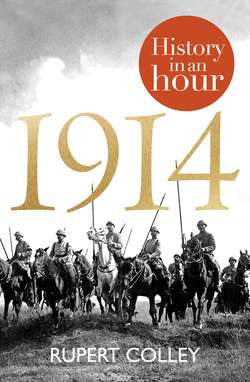Читать книгу 1914: History in an Hour - Rupert Colley - Страница 6
Treaties and Alliances
ОглавлениеMilitary alliances in 1914
These various ambitions and fears resulted in a number of treaties and alliances as governments sought to take sides in the name of defence and national security. Germany and Austria-Hungary signed the ‘Dual Alliance’ in 1879, a pledge to aid one another in case of an attack, with Italy adding their signature in 1882 to make it the Triple Alliance. (In 1902, Italy also secretly signed a similar agreement with France, in which Italy agreed to remain neutral should Germany attack France.)
Although technically a defensive agreement, the Triple Alliance caused much alarm. In 1894, as a direct consequence of the three-way treaty, France and Russia ratified a military alliance, resulting in what Germany feared the most – a potential enemy on both its western and eastern borders. In 1904, Britain signed an agreement with France, the Entente Cordiale. Although it was not a military alliance and did not commit either side should the other be attacked, the agreement did signal greater understanding between the two nations, recognizing their respective African territories and ending traditional rivalries.
Three years later, in 1907, Britain signed a similar agreement with Russia, partly to acknowledge their spheres of influence in Central Asia, where Afghanistan, in particular, had been a source of conflict for almost a century. So, in responding to what was happening in Europe, Britain had managed to forestall colonial enmity with two of its longstanding rivals. Thus the three nations, Britain, France and Russia, had, through the Triple Entente, formed a powerful counterbalance to the Triple Alliance. The powers of Europe had now set their stall and committed themselves to one side or the other.
Further afield, in 1902, Great Britain had signed an alliance with Japan with the aim of discouraging Russian expansionism in the Far East.
Despite the multiple failsafes against potential hostilities, war was nevertheless regarded by many civilian members of these states as inevitable and, for some, even desirable. War was seen in intellectual circles as a process of national rejuvenation, a means by which to cleanse the ills of society. In the 1890s, the German historian, Heinrich von Treitschke, wrote, ‘If the flag of the State is insulted, it is the duty of the State to demand satisfaction, and if satisfaction is not forthcoming, to declare war, how trivial the occasion may appear.’ The German Youth League, the Jungdeutschlandbund, declared, ‘War is beautiful.’ We must wait for it with the manly knowledge that when it strikes, it will be more beautiful and more wonderful to live for ever among the heroes on a war memorial … than to die an empty death in bed, nameless.’ While in Great Britain, Robert Baden-Powell, the founder of the Boy Scouts’ movement, urged young British boys to play their part in protecting the empire: ‘Play up! Play up! Each man in his place and play the game!’ Writing in 1899, British writer, Sidney Low, spoke for many when he wrote, ‘A righteous and necessary war is no more brutal than a surgical operation. Better give the patient some pain … than allow the disease to grow upon him until he becomes an offence to himself … and dies in lingering agony.’
War, when it came, resulted from discord in the Balkans, as Otto von Bismarck had predicted sixteen years earlier: ‘If there is ever another war in Europe, it will come out of some damned silly thing in the Balkans.’ But even Bismarck could not have predicted a war of such magnitude. Not many could. The exception perhaps was the political philosopher, Friedrich Engels, who in 1887, wrote, ‘Eight to ten million soldiers will swallow each other up and in doing so eat all Europe more bare than any swarm of locusts … Crowns will roll by dozens in the gutter.’ A prediction that would prove uncannily correct, but even within this apocalyptic vision, Engels predicted a silver lining – the ‘establishment of the conditions for the final victory of the working class’.
